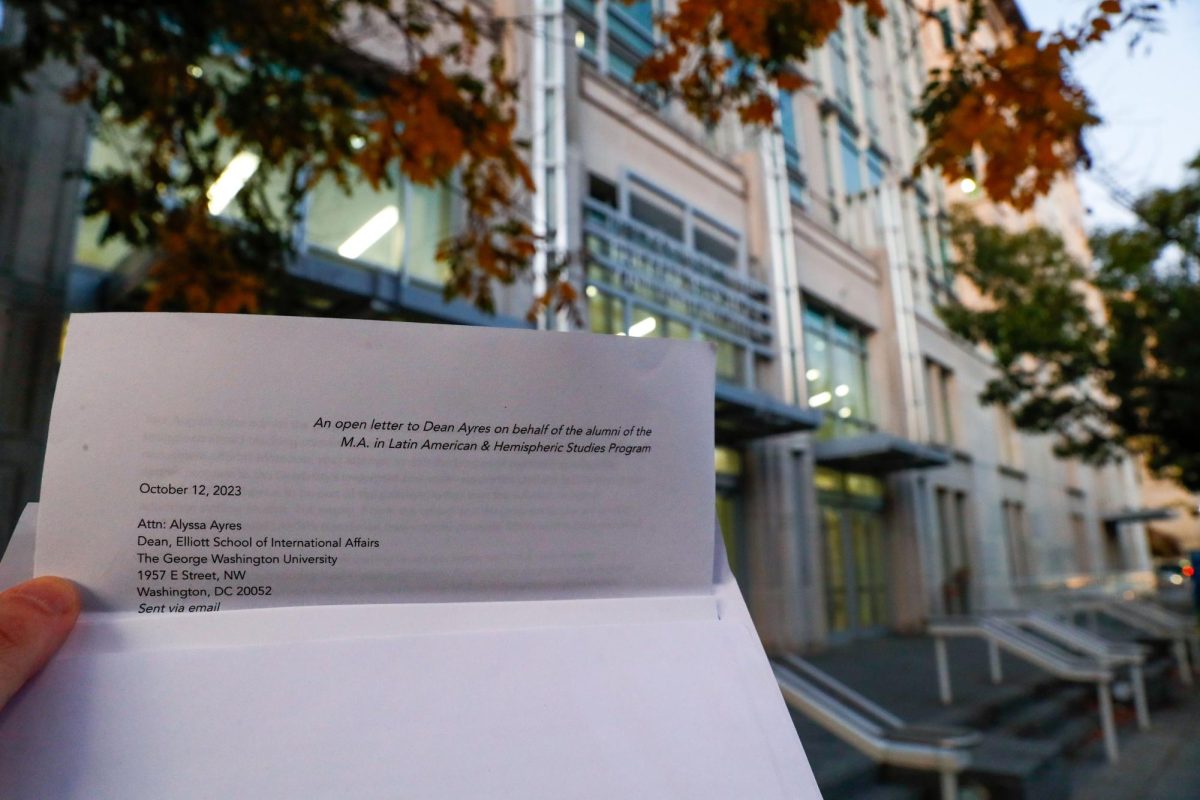Alumni of an Elliott School of International Affairs master’s degree program sent a letter to the dean this month, rebuking her reasons for sunsetting the program.
Thirty-seven alumni of the Latin American and Hemispheric Studies master’s program sent a letter to Dean Alyssa Ayres on Oct. 12 in response to officials phasing out the standalone degree program over the next two academic years. The letter denounces Ayres’ claims that financial constraints, faculty hiring difficulties and low enrollment led to the program’s termination as she outlined in correspondence with faculty and students.
The letter expresses alumni’s frustrations with not being consulted about the program’s phaseout, given their financial contributions and involvement in University boards, committees and initiatives. Ayres first sent an email to faculty Aug. 18 and then to current students Sept. 6, announcing the plan to phase out LAHSP and the European and Eurasian Studies program, according to emails obtained by The Hatchet.
Ayres said in the email to professors that students already enrolled in the program can complete their degree or transfer into a master of arts in international affairs, or MAIA, but did not explain this option in the email sent to students. Alumni said in the letter that officials offering a regional concentration in Latin America under MAIA as an alternative will eliminate specialized education that helps graduates stand out in their fields.
“Many of us chose to pursue graduate studies at ESIA already holding undergraduate degrees in international affairs and similar general studies fields,” the letter states. “Thus we chose LAHSP out of a competitive graduate admissions landscape, to differentiate ourselves in an employment market highly saturated with M.A. degree holders.”
University spokesperson Julia Metjian said the Elliott School is focused on “continued engagement” with alumni and that Ayres will talk to alumni about “issues raised” in the letter. She declined to comment on if officials will reconsider the decision or if they are concerned with a potential drop in alumni support and engagement for the school.
“Dean Ayres is in contact with the concerned alumni and looks forward to constructively engaging them on the issues raised in the letter,” Metjian said in an email.
Alumni sent the letter to Ayres and 17 other officials, including Benjamin Hopkins, Elliott’s senior associate dean of academic affairs; Laila Sorurbakhsh, the assistant dean of academic programs; and Diego Abente-Brun, the director of LAHSP. The letter argues the “intimate” and “highly personalized” nature of the program attracted alumni to the school and criticizes Ayres for using the cost of the program’s service obligations as a reason for its termination when she “admits” it is still financially viable.
“The direct and indirect costs of such expansive service obligations, as well as the fact it disproportionately falls upon our contract faculty colleagues raising issues of equity and fairness, has to be weighed against the large number of programs we administer,” Ayres said in her email to faculty.
In 2022, 19 students enrolled in the LAHSP cohort compared to 22 a decade prior in 2012.
“If both the cohort and the program faculty are already small, then how would LAHSP’s dissolution meaningfully decrease ESIA’s service commitments?” the letter states.
David W. Okun, a LAHSP alum and the alumni representative on the LAHSP Program Advisory Board, said he received “no communications” from the administration about thoughts of terminating the program and that officials have still not contacted alumni to alert them of the decision. He said the advisory board has not met in over two years.
“I had no idea that this was something that was being considered,” Okun said. “There was never any ‘Hey, enrollment is really down. We really need to focus on it or else the program’s at risk.’ None of that.”
Okun said he and alum Renee Fuentes reached out to alumni following The Hatchet’s reporting on officials sunsetting the program to ask if they were aware the program was ending. He said the response was “overwhelmingly negative” because alumni wanted officials to consult them on the decision, given their continued commitment to the University and LAHSP.
“A lot of us are donors, either financial donors to the University, as well as we give back our time and our service, like on these boards and helping with recruitment and being available to talk about careers,” Okun said.
Okun said the reasoning Ayres gave that the school struggles to attract faculty doesn’t make sense because he talked to program faculty who said a “number of faculty” expressed interest in teaching courses in the LAHSP.
Okun said the decision to phase out the program felt “short-sighted,” especially because officials provided no specifics on what offerings will be available to students through the MAIA concentration in Latin America. He said the lack of community input on the decision sends the “wrong message” about the University’s commitment to teaching in the region.
“I can’t help but think it shows quite clearly that the administration, that the school, that the University is devaluing or de-emphasizing the contributions of individuals from those regions, from those communities,” Okun said.
Okun said alumni provided two “full open weeks” of availability to meet with Ayres but a meeting has not been scheduled.
“That shows to me that they may not be prioritizing, yet again, the views of the alumni community in this decision,” Okun said.
A LAHSP student who spoke under the condition of anonymity for fear of retribution from the University said a group of current LAHSP students is calling for greater transparency about options for current students and their first step is to meet with Dean Hopkins.








